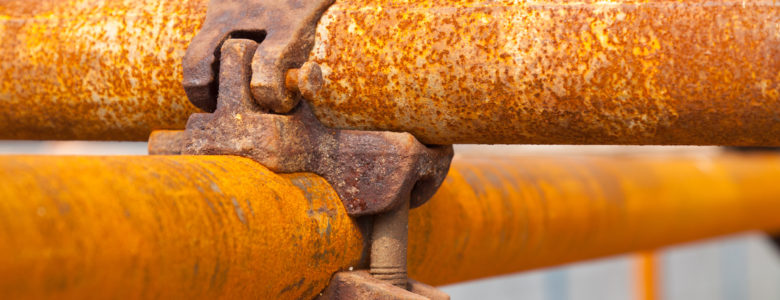America’s economy loses an estimated $300 billion annually due to metal corrosion. This is a figure that can keep anyone with an engineering project awake at night. Apart from the heavy costs, corrosion comes with risks such as putting employees’ life in danger, causing injuries, and even halting important projects. The fact that corrosion is difficult to see with the naked eye doesn’t make things any better.
Even so, pipe corrosion shouldn’t be a death sentence to your project. There are ways that can help keep this irksome metal punisher at bay and save a generous amount of cash. Keep reading to learn what pipe corrosion is all about and how to stop it in its tracks.
Pipe Corrosion
Have you ever come across a metal pipe that has rusty spots? These sections will in most cases seem worn down or eaten away. If yes, that was most probably pipe corrosion. Corrosion is a culprit known to cause the caving-in of metal pieces without any warning.
What causes pipe corrosion? This happens when metal comes into contact with elements such as grime, oxygen, water, and even other metal. After interacting with such elements, the metal loses electrons and becomes weak in the process. In the end, the metal becomes prone to other harmful reactions known to cause issues like holes, cracks, and rust.
The situation gets worse when it comes to pipes, because the corrosion self-perpetuates. This is simply to say the corrosion keeps going a notch higher if pipe protection interventions like pipe wear pads get overlooked. Fortunately, there is something you can do to avoid pipe corrosion from becoming a menace. Here are pipeline corrosion prevention tips you need to know.
1. Avoid Metal-to-Metal Contact
When it comes to the piping world, all metals do not get along–one might draw electrons from the other and cause galvanic corrosion. The loss of electrons will in most cases leave the metal weaker than it was before, thus compromising your structure. Insulating the metal is the best means of pipeline corrosion protection as it helps avoid metal-to-metal contact. Some of the best insulation methods in the market include pipe shoes and pipe wear pads. Pipe wear pads and other insulators work by creating a buffer zone between corrosive prone metals.
2. Structures Should Always Be Stable
Activities such as bouncing and jiggling, as well as friction, can take a toll on metals. Corrosive triggers find their way in whenever openings begin forming and it doesn’t take long before crevice corrosion sets in. Using a restraint is among the best ways to avoid crevice corrosion. The use of clamps, straps, and U-bolts can help scale down vibrations that could result in corrosion.
3. Pipe Cleaning
Any metal exposed to corrosive bacteria becomes prone to MIC (Microbiologically Induced Corrosion). Cleaning your pipes from time to time will avoid corrosive bacteria build-up, more so for pipes that frequently interact with sulfides. Biocides and other microbial inhibitors are a good way of keeping pipes clean.
4. Keep an Eye on Your Water
Particularly in copper pipes, water is a major cause of corrosion whereby low PH levels damage pipe lining. The best way to avoid pipe lining damage is by using water whose PH lies between 6.5 and 8.5.
5. Add Metal Protection
Special coatings and protective linings help prevent pipe corrosion. Bolts, joints, and beams will also benefit from such protection. Galvanization, for example, helps prevent pipeline corrosion by adding a zinc layer on iron, steel, and other metal surfaces. Using a sealant also inhibits corrosive bacteria from accessing crevices and joints.
6. Monitor Water Pressure
High water pressures and immense pipe stress go hand-in-hand. Subjecting pipes to a big deal of stress edges them a step closer to corrosion. This means that any inconsistent or high water pressure issue needs to be addressed as soon as possible.
Summing Up
Corrosion is a problem that no one should overlook. In order to keep corrosion at bay, always have these tips in mind. However, if this is a problem that seems to have gone overboard, seeking the help of a professional is wise. Piping experts are more conversant when it comes to corrosion mitigation methods such as pipe wear pads.



rachel frampton
My sister noticed that her pipeline is already rusty, and that is why she’s thinking of having it cleaned. Well, you are also right that corrosion may occur when the pipe consists of grimes, oxygen, and water. We’ll keep in mind to invest in an insulator too.